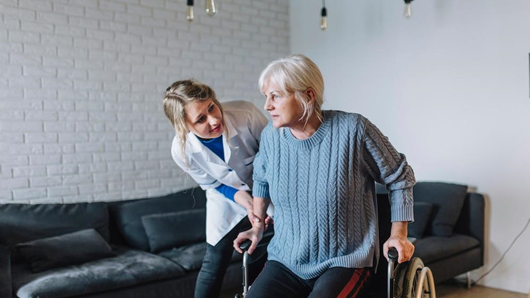
Family caregivers are vital in supporting their aging loved ones, but managing senior incontinence can be challenging. From addressing discomfort to finding resources, caregivers often navigate unfamiliar territory.
Support options include healthcare professionals, support groups, online resources, and specialized products. Open communication and empathy are also key to managing incontinence in seniors.
No caregiver should face this journey alone. With the right support, they can provide quality care while preserving their loved one’s dignity. Keep reading for helpful tips and resources.
Understanding Senior Incontinence
Senior incontinence, the involuntary loss of urine or feces, can greatly affect the quality of life for both seniors and their caregivers. It can stem from age-related changes, medical conditions, or medication side effects. According to Northwest Continence Center, understanding the different types—urge, stress, overflow, and functional incontinence—helps caregivers provide the right support based on individual needs.
Feelings of embarrassment or shame can lead seniors to withdraw socially, creating emotional challenges for both them and their caregivers. A compassionate and understanding approach can make a meaningful difference.
By recognizing incontinence as part of a larger health issue, caregivers can address it with sensitivity and care. With the right support and management strategies, seniors can maintain their dignity and quality of life.
The Impact of Senior Incontinence on Family Caregivers
Senior incontinence affects not only the individual but also their caregivers, who often bear significant stress and emotional burdens. Managing medications, scheduling doctor’s appointments, and handling incontinence care can quickly become overwhelming.
Caregivers may experience frustration, isolation, and helplessness, with the emotional toll sometimes leading to burnout. Physical exhaustion, anxiety, and depression can create a cycle that impacts both the caregiver and the care recipient.
Balancing caregiving with self-care is challenging, and neglecting personal health, relationships, and social activities is common. Recognizing these challenges is essential for caregivers to seek support and maintain their well-being while providing care.
Common Challenges Faced by Family Caregivers
A major challenge for family caregivers managing senior incontinence is the stigma surrounding the condition. Many seniors feel shame or embarrassment, making open discussions difficult and support harder to provide.
Caregivers also face practical difficulties, such as finding the right products and maintaining a routine that preserves the senior’s dignity. The demands of cleaning, changing, and assisting can be time-consuming and emotionally draining.
Navigating the healthcare system adds to the challenge. Finding knowledgeable specialists and accessing resources can be frustrating. Support systems can help caregivers manage these difficulties more effectively.
Seeking Support from Healthcare Professionals
Engaging with healthcare professionals is essential for caregivers managing senior incontinence. Primary care physicians can identify causes, recommend treatments, and refer specialists for a tailored plan.
Physical therapists offer exercises to strengthen pelvic muscles, while occupational therapists suggest strategies for daily independence. Pharmacists review medications, explain side effects, and guide treatment options.
Caregivers should ask questions, advocate for loved ones, and build strong healthcare relationships for better support.
Creating a Caregiving Plan for Managing Senior Incontinence
A thoughtful caregiving plan is essential for managing senior incontinence with dignity and confidence. It begins with understanding medical history, lifestyle, and personal preferences to create a structured and supportive approach. Key elements include establishing a regular bathroom schedule, monitoring fluid intake and diet, and identifying potential triggers. A consistent routine provides stability and reassurance.
Equally important is emotional well-being. In-home care, such as the support provided by Alpenglow Homecare at Missoula, emphasizes open communication, compassionate support, and actively involving seniors in their care decisions—fostering empowerment and improved quality of life.
Assisting with Personal Hygiene and Incontinence Management
Personal hygiene is essential in managing senior incontinence, and caregivers play a crucial role in maintaining their loved one’s dignity. Establishing a routine for regular hygiene practices helps prevent skin irritation and infections. Caregivers should assist with bathing, skincare, and changing incontinence products while ensuring comfort and privacy.
Choosing the right incontinence products is important—factors like absorbency, fit, and ease of use should be considered. Options include pads, adult diapers, and protective undergarments, and trying different products can help find the best fit.
Caregivers should also monitor for skin irritation or breakdown. Regular skin checks and proactive care help prevent complications, promoting overall well-being and dignity.
Emotional Support for Family Caregivers
Caring for a loved one with incontinence can be emotionally challenging, making support and self-care essential. Talking with trusted friends, family, or a counselor can help manage stress.
Joining caregiver support groups—online or in person—provides connection and practical advice. Taking time for hobbies, exercise, or social outings helps maintain well-being, ensuring caregivers can provide the best care.
Conclusion and the Importance of Self-Care for Family Caregivers
In conclusion, managing senior incontinence as a family caregiver can be a daunting task, but it is essential to remember that support and resources are available. By understanding the condition, seeking guidance from healthcare professionals, and utilizing assistive devices, caregivers can help their loved ones maintain dignity and quality of life.
Moreover, addressing the emotional and psychological aspects of caregiving is equally important. Caregivers should not hesitate to reach out for help, whether through support groups, counseling, or connecting with peers who understand their struggles. Prioritizing self-care and building a strong support network can significantly enhance a caregiver’s ability to manage the challenges of incontinence.
Ultimately, no caregiver should feel alone or overwhelmed in their role. By seeking out the right resources and fostering open communication, caregivers can navigate the complexities of senior incontinence with compassion and confidence. This journey may be challenging, but it can also be rewarding as caregivers work to ensure their loved ones receive the best possible care while preserving their dignity and enhancing their quality of life.




